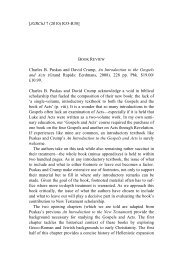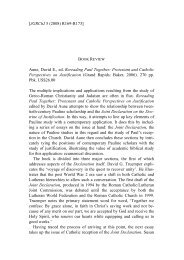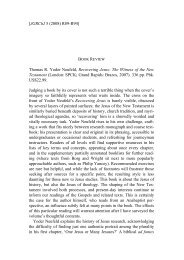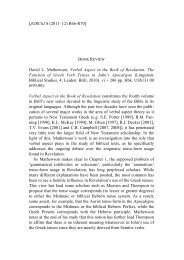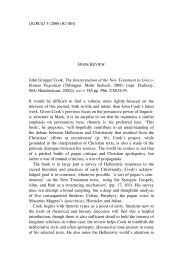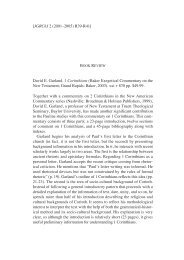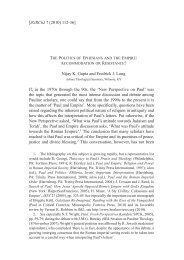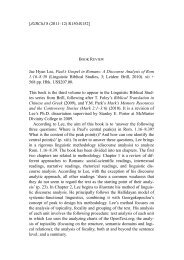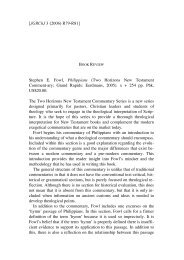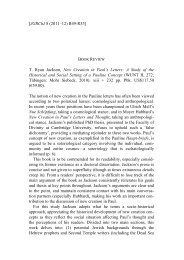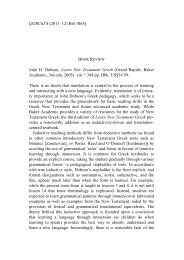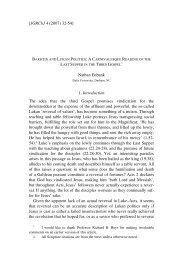Richard Liong-Seng Phua, Idolatry and Authority - Journal of Greco ...
Richard Liong-Seng Phua, Idolatry and Authority - Journal of Greco ...
Richard Liong-Seng Phua, Idolatry and Authority - Journal of Greco ...
Create successful ePaper yourself
Turn your PDF publications into a flip-book with our unique Google optimized e-Paper software.
Review: PHUA <strong>Idolatry</strong> <strong>and</strong> <strong>Authority</strong> R49<br />
eating <strong>of</strong> idol food. This is not the place to publish my own arguments,<br />
but in the spirit <strong>of</strong> critical evaluation I will make two observations.<br />
First, although <strong>Phua</strong> correctly dismisses the idea that the ‘weak’ are a<br />
purely hypothetical group <strong>of</strong> people, he does not take enough time to<br />
consider the real issue here. Are the ‘weak’ a self-declared faction with<br />
a public presence, or is Paul just talking in general terms about people<br />
who think <strong>and</strong> act a certain way? If we concede that the latter is a<br />
viable possibility, then it becomes perfectly reasonable to accept that<br />
the ‘weak’ are real people without accepting that they are a recognizable<br />
party involved in a public controversy. Second, <strong>Phua</strong> dismisses<br />
out <strong>of</strong> h<strong>and</strong> the possibility that the ‘weak’ are unbelievers. He assumes<br />
that the ‘weak’ are among Paul’s addressees, <strong>and</strong> he presumes to accept<br />
Paul’s characterization <strong>of</strong> them as evidence for beliefs they themselves<br />
hold. Readers who are in general agreement with the way that modern<br />
scholarship has framed Paul’s discussion are unlikely to stumble over<br />
<strong>Phua</strong>’s h<strong>and</strong>ling <strong>of</strong> these issues. To my mind, however, <strong>Phua</strong> proceeds<br />
with assumptions that render his eventual conclusions unpersuasive.<br />
It is in the middle chapters <strong>of</strong> <strong>Idolatry</strong> <strong>and</strong> <strong>Authority</strong> that <strong>Phua</strong><br />
provides his most substantive work, <strong>and</strong> it is the material in these<br />
sections that will likely prove to be the book’s most helpful contribution.<br />
Chapter 2 employs the work <strong>of</strong> Moshe Halbertal <strong>and</strong> Avishai<br />
Margalit in order to define idolatry in a comprehensive way. The result<br />
is a contemporary scheme that characterizes idolatry from a multifaceted<br />
perspective <strong>and</strong> refuses to accept a single, clearly-defined<br />
notion <strong>of</strong> idolatry. According to this scheme, idolatry should be<br />
described as having several ‘intellectually separable’ definitions that<br />
appear in various combinations at various times <strong>and</strong> places throughout<br />
the history <strong>of</strong> Judaism (p. 35). Interestingly, as <strong>Phua</strong> helpfully demonstrates,<br />
these intellectually separate definitions <strong>of</strong> idolatry are all<br />
present in ‘the foundational Diaspora text <strong>of</strong> the LXX’ (p. 48).<br />
As <strong>Phua</strong> rightly observes, having such a complex <strong>and</strong> subtle<br />
perspective on idolatry allows the modern scholar to evaluate (<strong>and</strong><br />
even predict) points <strong>of</strong> inter-Jewish conflict. It highlights certain<br />
behaviours that could conceivably have been deemed idolatrous by<br />
some Jews in history but not by others. Along this vein, Chapter 3 aims<br />
to prove that Jewish groups were liable to choose from among the<br />
intellectually separable definitions (p. 50). This is accomplished though<br />
a survey <strong>of</strong> Diaspora literature that is broken down into five components:<br />
Wisdom <strong>of</strong> Solomon, Philo, Josephus, Joseph <strong>and</strong> Aseneth



